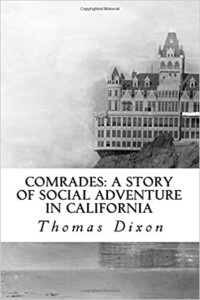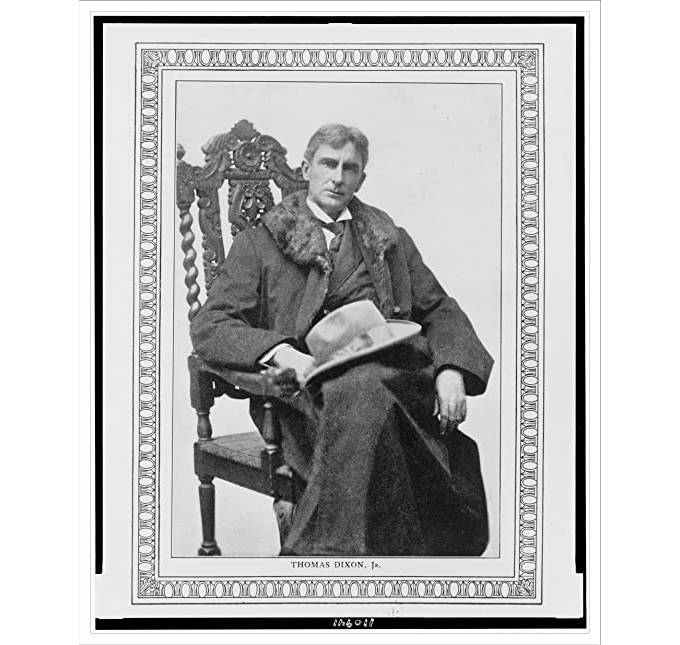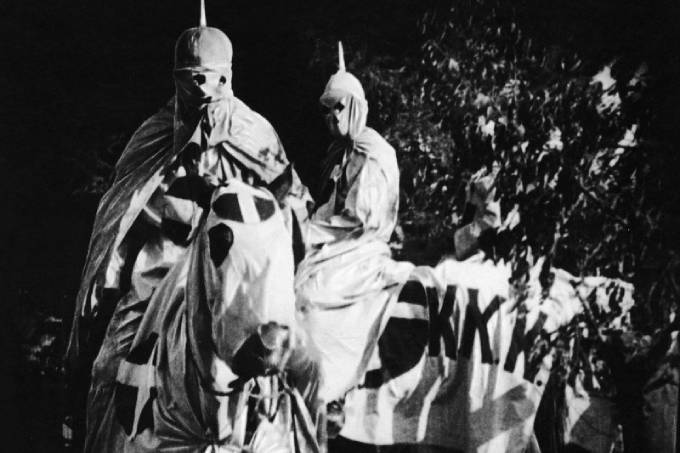Like most days recently, my reflections this Memorial Day tend to focus on the failure of John Steinbeck’s vision for America and the rise in racism, militarism, and nationalism fostered by Donald Trump. There’s no doubt in my mind that our current president is unburdened by such reflection—or that Steinbeck, a New Deal Democrat, would despise Trump even more than he did Richard Nixon, whose election in 1968 contributed (I suspect) to Steinbeck’s death at 66. My grandparents were senior members of Steinbeck’s generation and remained divided on the subject of Steinbeck’s president, Franklin Roosevelt—grandmothers for, grandfathers against, arguments not infrequent. All four grandparents grew up in the anti-Reconstruction, pro-segregationist North Carolina that produced Thomas Dixon Jr., a silver-voiced, white-maned white supremacist whose 1902 novel The Leopard’s Spots—published the month John Steinbeck was born—gave rise to the 1915 film Birth of a Nation and to the resurgence of the Ku Klux Klan in 20th century America. The rancid controversy surrounding The Leopard’s Spots and its sequel, The Clansman, was much in the air when Steinbeck was a boy in California. Evidence of Dixon’s remarkable life in North Carolina was everywhere when I was growing up in that state. Memorial Day 2020 seems as good time as any to recall the curious career of Thomas Dixon. After all, he helped birth Donald Trump.
Dixon’s people were Scots-Irish, English, and German, like Steinbeck’s and mine. His home town of Shelby—in southwestern North Carolina, near the South Carolina line—was on the way to Lake Lure, where my favorite aunt and uncle had a summer place that attracted dozens of relatives, sometimes all of us at once. Dixon’s father was a Baptist preacher-farmer who owned slaves and believed in education, and Dixon entered Wake Forest, my undergraduate school, at the age of 15. A better student than Steinbeck or me, he graduated from college with a master’s degree at 19. At Johns Hopkins he befriended a fellow graduate student named Woodrow Wilson before dropping out to test his talent as an actor in New York. Failing that he went home again, to North Carolina, and enrolled at a law school in Greensboro, O’Henry’s town and the place my parents moved to after I was born. Aycock, my junior high school, was named for the North Carolina governor who became one of Dixon’s friends in high places. My high school—Walter Hines Page—was named for the North Carolina editor who befriended the young lawyer when he was elected, age 20, to the state legislature. Later Page became a partner in the New York firm that published The Leopard’s Spots and The Clansman. Dixon became a Baptist preacher, platform lecturer, best-selling author, movie producer, and millionaire. In 1913 Woodrow Wilson became president, and in 1915 he endorsed The Birth of a Nation after Dixon arranged for a private screening at the White House. Dixon died in 1946, three months before I was born. The Flaming Sword, his anti-communist, anti-integration, anti-utopian final novel, was published in 1939, a few months after The Grapes of Wrath.
From Comrades and The Clansman to In Dubious Battle
What’s the connection with John Steinbeck? Comrades: A Story of Social Adventure in California, the novel Dixon wrote and published in 1909 as a critique of the pacifistic, collectivist utopianism of Upton Sinclair, another hyperactive Southerner-turned Californian. Set on Catalina Island in 1898-1901, it satirizes American socialism as a watered-down version of international communism: adherents sing the Marseillaise, anthem of the Paris Commune of 1871, and apostles include sinister subversives with European accents and dreams of domination. In addition to its hero Norman Worth—an anti-Jim Nolan rich-kid who, like the protagonist of Steinbeck’s In Dubious Battle, succumbs to the pressure to join—Dixon’s cast of characters includes a Jack London-ish poet and spouse who slug it out like a pair of amatory boxers; a religious manic, called Methodist John, who is “forever shouting ‘Glory, Hallelujah’” at meetings; and a skeptic called Truth Seeker, a “human interrogation-point” who asks the right questions and makes the wrong enemies, like Doc Burton in Steinbeck’s 1936 novel. I’ve always wondered about a comment Doc makes to Jim, characterizing communism as “pure religious ecstasy” and communists as “partakers of the blood of the Lamb,” midway through Steinbeck’s story. That seemed odd to me coming from a professional secularist and skeptic like Burton—until I read Dixon’s description, early in Comrades, of a socialist rally in 1900 San Francisco: “Norman turned and looked over the crowd of eager faces—and every man and woman singing with the passionate enthusiasm of religious fanatics—an enthusiasm electric, contagious, overwhelming. In spite of himself he felt his heart beat with quickened sympathy.”
 Dixon the propagandist of lost causes; Steinbeck the psychologist of latent motives. Antithetical in spirit on issues of justice, peace, and equality, they shared a rich, red-letter language, rooted in the King James Bible, that left plenty of room in their prose for poetry. I don’t know if Steinbeck read Comrades or ever met its author. As with Trump, I’m certain he would have hated both if he did. And knowing there’s a lynching coming, I confess that I can’t make myself watch Birth of a Nation all the way to the end. But I’ve read all of The Clansman, and it’s easy enough to imagine Trump’s father Fred, a Ku Klux Klan supporter in 1920 New York—or Trump’s white nationalist supporters in 2020 Charlotte or Charlottesville—responding positively to this passage from The Leopard’s Spots: “In a democracy you cannot build a nation inside a nation of two antagonistic races; and therefore the future American must either be an Anglo-Saxon or a Mulatto.” These words are worth remembering this Memorial Day. Reading them again, I realize I was right when I worked at Wake Forest 40 years ago and suggested that the portrait of Thomas Dixon Jr. in the library be moved to make way for one of Gerald Johnson, the Wake Forest alumnus who succeeded H.L. Mencken as the voice of iconoclasm at the Baltimore Sun. But that’s a memory for another Memorial Day.
Dixon the propagandist of lost causes; Steinbeck the psychologist of latent motives. Antithetical in spirit on issues of justice, peace, and equality, they shared a rich, red-letter language, rooted in the King James Bible, that left plenty of room in their prose for poetry. I don’t know if Steinbeck read Comrades or ever met its author. As with Trump, I’m certain he would have hated both if he did. And knowing there’s a lynching coming, I confess that I can’t make myself watch Birth of a Nation all the way to the end. But I’ve read all of The Clansman, and it’s easy enough to imagine Trump’s father Fred, a Ku Klux Klan supporter in 1920 New York—or Trump’s white nationalist supporters in 2020 Charlotte or Charlottesville—responding positively to this passage from The Leopard’s Spots: “In a democracy you cannot build a nation inside a nation of two antagonistic races; and therefore the future American must either be an Anglo-Saxon or a Mulatto.” These words are worth remembering this Memorial Day. Reading them again, I realize I was right when I worked at Wake Forest 40 years ago and suggested that the portrait of Thomas Dixon Jr. in the library be moved to make way for one of Gerald Johnson, the Wake Forest alumnus who succeeded H.L. Mencken as the voice of iconoclasm at the Baltimore Sun. But that’s a memory for another Memorial Day.
A native of Winston-Salem, North Carolina, William Ray graduated from Wake Forest at the age of 20 and received a PhD in English from the University of North Carolina at the age of 24. Other than that, he claims no kinship with the ghost of Thomas Dixon Jr.




I cannot decide if my personal reaction to the paper’s opening statement, “Like most days recently, my reflections this Memorial Day tend to focus on the failure of John Steinbeck’s vision for America and the rise in racism, militarism, and nationalism fostered by Donald Trump” is simply due to the choice of words by the paper writer or my poor understanding of the sentence. Steinbeck was an Introverted SENSATION Thinking type with perception the dominant function. This functional type makes for an exceptionally gifted journalist. I don’t believe he maintained an unrealistic “vision for the future of America.” His perception or vision of America would be limited to what “IS” and not what could or will be. His writings were confined to conditions and characters as he perceived them — an objective style he maintained throughout his productive life. This non-teleological perspective that shaped his perception and judgment served him well and endeared him to his fans. The opportunity to predict the future from a Steinbeck work was left to the reader.
Regarding “…the rise in racism, militarism, and nationalism fostered by Donald Trump.” I believe the writer is giving far too much intellectual credit to a president who does not or cannot even read his security briefings. I’m quite certain the writings of John Steinbeck would also be avoided and therefore would not inspire his influence.
Racism, nationalism, and militarism in the USA have not grown as a result of the influence of Donald Trump. Broadcast news and social media are responsible for raising the awareness of such things in an an increasingly individuated population; that is, one with larger percentage of citizens becoming conscious of themselves and the world about them. At the same time there is increased push back against such social sickness as a result of communication advances.
Such things as racism, nationalism, and militarism are basic tools of dictatorships in forming scapegoating targets. The Nazis used it very well. Trump studied Hitler and applied the same techniques on our Mexican brothers and sisters. Trump’s wall is only affective for that purpose, Many find a saw purchased at the Dollar Store sufficient to break through the wall.
Those interested may want to check out what is happening currentkt in Russia under Putin and the Russian MOB. Racism, nationalism, and militarism are in full bloom with the Russian Orthodox Church and the Cossacks. Individual freedom has been eliminated.
A population with an increased percentage of individuated citizens is the main defense against such social poisons because voters in such a social environment seek leaders who serve like the mayor in The Moon Is Down, rather than a president who promises to be a daddy figure and make their real and imagined boogey men go away.
I agree (almost) entirely what you say. But I don’t think The Donald “studied” Hitler; as you, yourself, admit earlier on: I believe the writer is giving far too much intellectual credit to a president who does not or cannot even read his security briefings.
The Donald and “Uncle” Adolf were two similar personalities: thinking only of themselves; and not the greater good.
Michael,
I believe you are correct. I mistakenly understood his reported admiration for Hitler’s tactics and concluded he may have read Mein Kampf. However even Benito Mussoliini, who was an educated journalist, said it was a terrible book.
I cannot ignore Trump’s admiration for the Russian MOB’s dictator Putin and North Korea’s Kim Jun Un, both wielding absolute and unchecked power over their population with nationalism and militarism.
The common denominator for dictators is the abiity to appeal to the unconscious, uneducated, and poorly evolved citizens who seek daddy figures tolead. They have not realized the value of a leader who serves in a democracy of free humans
Thank you for the response,
Wes
“Dixon the propagandist of lost causes; Steinbeck the psychologist of latent motives.” Will, you could (and perhaps should) write a book exploring Steinbeck as the “psychologist of latent motives.” What a fantastic formulation!
Great idea.; Perhaps it could be developed in the form of a handbook instructing a systematic way of naming future Steinbecks and Ricketts so that they can then be supported to make it easier for them to challenge the parochial hierarchy that may exist within scholarly fields. Ya know, the ones tight fistedly managed like Steinbeck’s literary critics with their tender egos who have produced nothing of value themselves but lay in wait ready to pounce on anyone who does have the courage to lay their creativeness before the public. Yep that’s a great idea!.